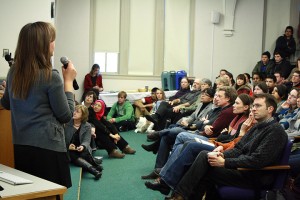By Jumi Bello & Lily Jamaludin
For the past week, waves of revolution have spread across North Africa and the Middle East. After mass protests sprung up in Tunisia, demonstrations arose in Yemen, Jordan, Syria, Saudi Arabia, and, most extensively, Egypt.
It all began in Tunisia. On Dec. 17 in Sousse, Tunisia, Meriem Trabelsi ’13 woke up in her hometown, Sousse,Tunisia to news of a protest for an end to the Tunisian President Zine El Abidine Ben Ali’s 23-year dictatorship in the South.

It was small in the beginning, as Trabelsi, who supported the protest, remembers. In the second week of January, the protest took a serious turn when the President and his family left the country on the 14th.
“We didn’t have freedom of speech or anything so you couldn’t say what you thought while the President was in power,” Trabelsi said. “His family was very corrupt, so I’m very happy that they’re gone.”
Demonstrations happened all over the country on Jan. 14. Trabelsi celebrated the Tunisian dictator’s plight in her own town of Sousse.
“When the President left, the country was in complete chaos for three days,” Trabelsi said. “We had a curfew. Personally, nobody in my family died or got injured..”
Trabelsi was supposed to arrive on campus on Jan. 22 but the revolution in Tunisia closed the airports and delayed her arrival to campus.
The victory of Tunisian protestors and Ben Ali’s flight signified an unprecedented change and sent ripples through the Arab world.
On Tuesday, Jan. 25, protests began in Cairo for the fall of Egyptian President Hosni Mubarak and his thirty-year rule. The Tunisian uprising spurred the revolution, but for decades Egyptians have complained about corruption, rising food prices, repression and lack of freedom of speech, as well as high unemployment rates.
Mubarak deployed the army with tear gas and water cannons to contain the protests, and temporarily blocked citizens from the Internet and phone service. The protests in Tahrir Square were organized through Facebook, similar to the way protestors in Iran last year organized on Twitter.
Mohammed Elamawy, the Grinnell College Arabic Language Assistant from Egypt, hasn’t been getting much sleep lately. Instead, he’s been spending his nights watching the Arabic media coverage of the demonstrations. Elamawy has been talking to friends and family everyday, but no information has been released to them because he believes the government is not telling the truth.
“I know for a fact that the things on the [Egyptian] public television are very biased, [and] flourish the image of the President,” he said. “I’m sad for what’s going because I’m here, and I want to be there, with the people there…in the streets, [against] the government and the regime.”
But Elamawy found a way to express his opinion. Last Saturday, he joined over 1,000 others in Chicago to demonstrate in front of the Egyptian consulate.
“We wanted to be in this situation, we wanted to do something. The least that we could do was to go there,” he said.
In fact, on Tuesday, Feb. 1, Mubarak stated in a televised address that he would not be running the upcoming 2011 presidential elections. However, protestors are not satisfied and the uprising still continues. Whether Mubarak will continue to make attempts to appease the demonstrators, or whether he will step down is still to be seen.
Noah Tetenbaum ’12 studied abroad in Cairo last semester, and witnessed the revolution in its beginning stages.
“I hope that it can lead to some sort of lasting, representative democratic system,” Tetenbaum said. “I hope that the people are ready for it, that the country’s ready for it.”
While he was abroad, his Egyptian friends and classmates believed that despite their desire for revolution, little would change Although Tetenbaum supports Cairo’s revolution, he agrees with his Egyptian friends.
Despite their worries, many hold hope for the future of democracy in the Arab World, and everyone agrees that things are going to change.
“Two months ago, this was unbelievable,” Trabelsi said. “If I said that we were going to kick out our dictator, nobody would believe me. I’m very proud that Tunisia was the first one and that other Arabic countries are following the same path. I don’t know how it’s going to be in Egypt. In Egypt, it’s another story and other things are involved, so we’ll see what happens.”
Elamawy also expressed his concern regarding the recent attacks on protestors by pro-Mubarak supporters. To him, it signified a turning point in the protests—a move from peaceful demonstration to violence. While he always believed that Mubarak needed to step down, he also believed it should be done respectfully as it was done in Tunisia.
“Now,” he said, “it just needs to be done.”



















































